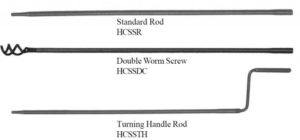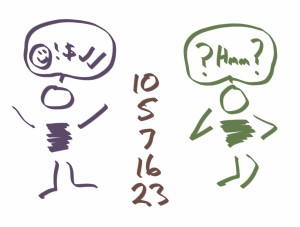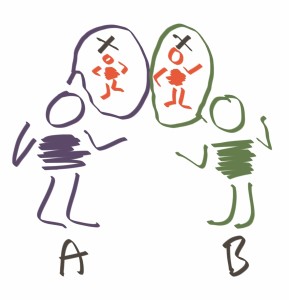An interesting experience at the local fried chicken store. Last time I went to my local fried chicken store I was struck by the total lack of awareness by the staff. The simple process of taking orders, preparing food, bagging and final delivery was completely off the rails. The bizarre thing was that it had gone off the rails mostly because of one “helpful” person. To summarise the situation I’m at the counter to order and ended up waiting more than 10 minutes for a staff member to take my order. The store was not overly busy only a few customers. So why the long wait before taking my order? The staff member in question had left his post “the register” to aid another front of house staff member in bagging orders. Nice of him but in more than 10 minutes he never kept an eye on the counter for new customers and no other staff member bothered to notice. I personally would have walked out 3 times over but my son wanted Fried chicken so we stayed. While waiting and watching the process the staff were engaged in I noticed they were waiting upon menu items which were not ready yet. The back of house staff never glanced at the counter, the front of house staff had their backs to the register meanwhile the customer waited. Eventually the male staff member came to the register and took another customers order who had been standing there waiting. I actually thought she had already ordered but she hadn’t. Upon taking her order he proceeded to go off to the bagging area to help his fellow female counter part.
Now all this time I was wondering if the two young people had been trained in front of house customer service. The basics of any food outlet the way I see it is get the order as soon as possible, once you have their order they are hooked and wait. One of the metrics most organisations use for customer relations is the wait time, answer the phone call in 3 – 8 rings etc. Back to the “process” I use the term loosely; while the staff were waiting on the menu items, no orders were taken therefore the cooking team could not prepare the food in the meantime for the other customers. The kitchen staff never glanced at the counter to gauge the up coming work load, the management never appeared from the back of the store/kitchen. This was not rush hour (5 people in the store) but the entire team at the local fried chicken store had bottle necked.
The counter staff handed the food to the previous customers apologising for the delay. I was thinking ‘if you take the orders while waiting for the not prepared menu items, the wait would not be so great’. The order taking process is the most crucial and shortest compared to those following.
Several minutes passed and then the female staff member came to take my order. Meanwhile two other customers entered and the older man walked start up to order in front of me. Realising the error, the female staff member asked me for my order. When she asked me if she could take my order, I smiled and enquired in a gentle polite manner if she had been trained in customer relations. The intent of the question was not to offend but to genuinely discover if the chicken store or the management team had trained her and her male counter part for front of house. My question was ignored, so I added “you have to keep an eye on the register when your at front of house”, to make her aware that it is important. At this point the pushy older male customer became animated accusing me of being abusive to her and that she did not have to put up with that etc. All the while he was backing away from me towards the exit, a man of conviction. This is the classic guilt mixed with snap judgement scenario, the old man had pushed in and without knowing what had happened before, the lack of process, he assumed that my question was because she had gone to take his order before me. This type of person is no help and beyond help in fact I consider him a moron because only a moron would get involved wth little or no facts. However, guilt is a funny thing.
Now let me expand, I know I somehow intimidate people by my looks and my honesty but I am very aware of this and try to be super gentle when interacting with people. The female staff member did not appear upset but more surprised. In fact the old man caused more of a scene than anyone, ironic, guilt again. I then proceeded to give my order clearly and distinctly, “4 zee burger combos, regular and 1 pepsi max and 3 sunkist”, she read it back to me “a zee burger combo, 1 pepsi max and 3 sunkist”. I corrected her “No, 4 zee burger combos, regular and 1 pepsi max and 3 sunkist”, she read it back to me “3 zee burger combos, 1 pepsi max and 3 sunkist”. I corrected her again “No, 4 zee burger combos, regular and 1 pepsi max and 3 sunkist”. Finally on the third try she got it correct. Now she may have been flustered by my question or the old man but the question of front of house training seemed rather relevant at this stage.
Anyway the order was thrown together, dropped she asked me if I wanted the receipt, to which I replied “yes” and I left.
The receipt has a survey link on it for feed back, she didn’t inform me of this but I knew anyway. I took the food home and proceeded to fill in the online survey. Needless to say very dissatisfied appeared in more than one box. What was interesting was the question asking about cleanliness. I responded by checking the “neither satisfied nor dissatisfied” option, yet in the survey process I was later asked why I gave them a dissatisfied. Poor coding? The fried chicken store can’t listen? Who knows. I responded that I gave a neutral answer in the survey.
Why is your helping not helping? a funny story.
Now I’m a fixer, yes one of those genetically predisposed “idiots” that when I see a problem I feel a need to put it right. Therefore, when I saw a blocked drain I grabbed my set of plumbing springs
and began to clear the drain. Soil, roots the usual mess and eventually the drain was all clear. Now in the meantime my father was helping (yep you know where this is going). So while I was still working on the drain he decided to help by picking up all the soil I had pulled out and put to one side. My helpful father began to scrape up the debris and remove it. I had to move my stack of springs which were near me and the debris, to give him room to work. Now a set of old fashioned plumbing springs have a special tool called a separation key. This key is
designed to hook the end of the spring and pull it, enlarging the spring spiral while you twist it to separate the springs from each other. Now this little tool is a must because the springs become incredibly tightened during use and separating them without this tool is a nightmare. I noticed that my separation key was not near the unused springs. Yep he had somehow picked up a 100mm key and thrown it out, without noticing. Yes thrown it out, he had placed the debris into the garbage bin out on the curb for collection that very day. After some digging and head shaking I found the key and could now get back to cleaning the drain.
These two stories actually have a common thread of helping “going pear shaped” and becoming the opposite of helping.




